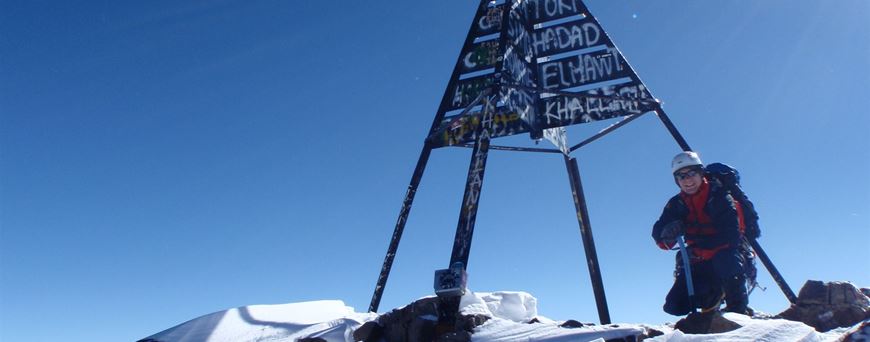
Scott Heffield Expert Interview
For those of you not familiar with Scott Heffield's name, you might wonder if his job title of Project Development Manager isn't just a little mundane sounding.
However, once you factor in that he's a former commando, the job is at the Bear Grylls Survival Academy, and the role includes travelling the world to search out new locations to feature, it all sounds quite a bit more interesting!
Scott has worked on Bear's various TV shows such as Born Survivor and The Island for some time, his hardcore experience earning him responsibility for coordinating Bear's stunts and assessing risk. He was the male mentor for the recent ITV series 'Mission Survive' - and he'll be back on your screens with the second series of that (and CITV's Bear Grylls' Survival School) in Spring 2016.
Hi Scott, thanks for joining us. How did you get into the adventure scene?
I joined the Royal Marines aged 16 years and 4 months and basically passed out from training as one of the youngest Royal Marine Commandos ever. So at an early age I was skiing in Norway, abseiling from helicopters and learning to survive - and of course fight - in some of the world's toughest environments.
Four years later I became a Physical Training Instructor in the Royal Marines and shortly after this I was sent to Llanrwst in North Wales and became a climbing instructor, mountain leader and kayaking instructor. That's where it really all began.
An impressive CV! In all of that time, what are your best and worst camping memories?
My best camping memory is going to the Brecon Beacons with my uncle John (a police officer) when I was seven or eight years old. We took Pen y Fan, Fan Y Big and one of my favourites, Cribyn, all in one sitting.
I seem to remember not enjoying it that much at the time!
My worst experience camping was 36 hours spent in a snow hole alone, on the side of Mt Elbrus in Russia up at 5,000m in a white out. Thirst and cold were the low points. Oh, and cold again. Did I mention that?
Brrr! In happier moments, where is your favourite place in the UK? Where do you keep going back to?
Tryfan in North Wales, love it. I must have climbed the North Ridge 100 times, each time taking a slightly different route. It's a proper Alpine peak with Alpine ridges, rock, exposure and the need to use your hands and on occasions a rope as well. Get on it!
What three tips would you give to people interested in doing what you do?
Gain as much experience as you can, and from whoever you can. It's a good idea to visit one of the national training centres such as Plas y Brenin and bag a couple of basic courses such as ML (Mountain Leader) or SPA (Single Pitch Award).
Cross train and, if possible, cross qualify. In other words, don't just look at mountain training awards. Look at ERCA (trees and ropes), IRATA (fixed structures) and little adquals such as first aid, survival training and health and safety awards (IOSH, NEBOSH). All great training and very much needed in my world.
Finally, make the effort. The mountains won't come to you, so get out and practice, practice, practice.
Who's your ideal travel companion?
My climbing partner Malcolm. I talk non-stop and he doesn't talk at all, perfect. In fact, I think he is dead inside! I climb the technical stuff and he carries the heavy equipment. It's a partnership made in heaven.
Does Malcolm see it that way!? What's the best advice you've ever been given?
Know when to stop and turn around or go back.
I usually look at Malcolm and when his eyes are bleeding and he's crying uncontrollably, that's his first sign.
The truth is, indicators like poor weather, lack of energy or bad planning seem obvious, but you get clouded with what's called 'summit fever'. That mixed with adrenalin can push you forwards towards the summit when you should be turning back.
All the more reason why we climb with experienced partners to keep each other balanced - and if one partner wants to turn back, both do. You have to recognise the factors and remember that the mountain will always be there.
Even when you reach the summit the mountain is only half-climbed - it's only fully climbed when you're back safely.
What has been your most life changing adventure?
I spent almost a year down in Antarctica and managed to spend time on South Georgia, and on the Ross Ice Shelf, etc. During that time I learnt all about Sir Ernest Shackleton and his epic 1916 adventure. Surely the greatest survival story of all time. Please read it and be inspired.
What smaller adventures would you recommend to encourage people outside of their comfort zone?
Anything and anywhere in winter conditions - snow and ice. Start with something not so committing and go from there. Try the Brecon in early spring with maybe a little snow still left on the summits.
Is there an adventure you'd put on every bucket list?
Get up to Scotland in winter and bag a winter route on the North Face of the Ben. It doesn't have to be an epic, a grade i or ii is great fun. If you don't think you have the skills to do it alone, grab a local guide, they are worth every penny.
Finally, what's the strangest thing you always pack?
My smoking pipe for those all-important summit photos. All adventurers smoke a pipe - Shackleton, Mallory, Hillary and Tilman!
Brilliant! Thanks so much for taking part Scott.
Scott is on Twitter as @yompscott. The Bear Grylls Survival Academy can be reached via their website, Facebook or @BGSurvival on Twitter.














